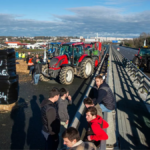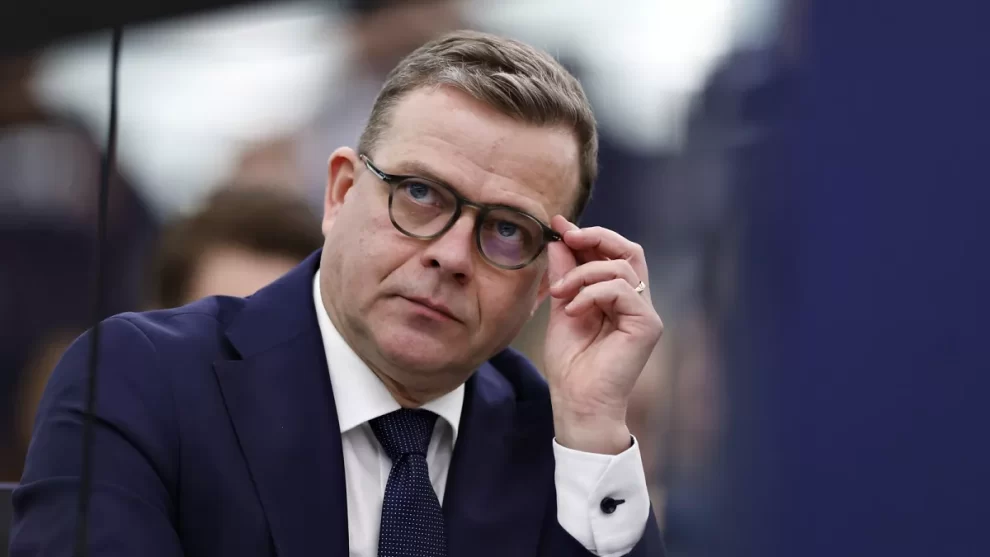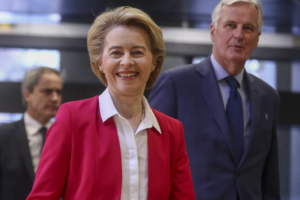Russia is attacking the EU on multiple fronts, from GPS jamming to weaponizing migrants, and the bloc has to do a better job of responding, Finnish Prime Minister Petteri Orpo told POLITICO.
“We have to recognize that Russia has changed behavior. Russia is aggressive, uses all kinds of hybrid tools against the West, against Europe,” he said in a video interview from his office in Helsinki.
Finland has itself seen a lot of malign activity — much of it blamed on Russia.
The Balticconnector gas pipeline — linking NATO members Finland and Estonia — was ruptured last year, along with underwater telecoms cables connecting Estonia to Finland and Sweden.
The Baltic Sea region has also seen massive disruptions to GPS systems, with investigators pointing to locations inside Russia as the source. Finnair suspended flights to Tartu, Estonia due to the interference; Estonian authorities blame Russia.
Moreover, Russia has sent hundreds of migrants over its border with Finland, prompting Helsinki to shut the frontier.
And on Wednesday, Russia’s defense ministry proposed unilaterally to change its maritime border in the Baltic Sea (before quickly backtracking).
« Russia has not been in contact with Finland on the matter. Finland acts as always: calmly and based on facts, » Orpo said in a statement.
Finland has been a particular preoccupation of Moscow, due both to its strategic location and to the fact the formerly neutral country joined NATO in 2023 in response to Russia’s invasion of Ukraine.
But other countries are also seeing an uptick in Russian threats.
Germany, Poland and the Czech Republic said in early May they had been targeted by the Russia-controlled Fancy Bear hacking group, while Poland this week arrested nine members of a suspected Russian sabotage outfit. Meanwhile, the Czech Republic has accused Russia of planning to undermine rail safety.
Russia ally Belarus has also allowed thousands of migrants to cross its borders illegally with Poland, Lithuania and Latvia.
“We can see from Russia [that] we have to prepare ourselves for attacks against our critical infrastructure, energy, cyber etc.,” Orpo said.
The Finnish PM is calling on the EU to boost its ability to respond to such threats.
He wants the next EU Strategic Agenda, which defines the bloc’s priorities for 2024-2029, to include a Finnish proposal to create an EU Preparedness Union. The idea is to piggyback on Finland’s experience to make the EU as a whole more resilient.
“My target is that in June, in the next Strategic Agenda, we have a clear decision to build the Preparedness Union,” he said.
In March, Commission President Ursula von der Leyen asked former Finnish President Sauli Niinistö to write a report on preparedness — both civilian and military.
Orpo said the Preparedness Union is not just about Russia or about gearing up for war. “The threats can also be pandemic, environmental crises, energy crisis, all kinds,” he said.
Helsinki has been trying to limit the damage Moscow can do.
On Tuesday the government submitted a proposal to the country’s parliament to temporarily suspend the acceptance of asylum applications on parts of Finland’s border. The idea has drawn fire from humanitarian groups, who say it violates Helsinki’s international obligations to people seeking protection from persecution.
Poland and other countries have also been criticized for pushing migrants back into Belarus and not letting them file asylum applications.
“Today, the situation in our border it’s quiet, but it’s because we have done strong measures, we have closed all the border crossing points, but we still know that there are thousands of immigrants from third countries waiting [for the] possibility to come to our border and we know that Russia can use them whenever,” Orpo warned.
The EU agreed on a Migration Pact this year that changes asylum rules and makes it easier to turn people back who have been encouraged to migrate to the EU illegally by third country governments — a practice known as instrumentalization.
But Orpo said the EU needs to do more than just manage the border threat.
« We need tools to stop the phenomenon, and this is different, » he said. « This is not question of managing immigration. We need tools to stop it, because this is a weapon against us.”
Source: Politico





































